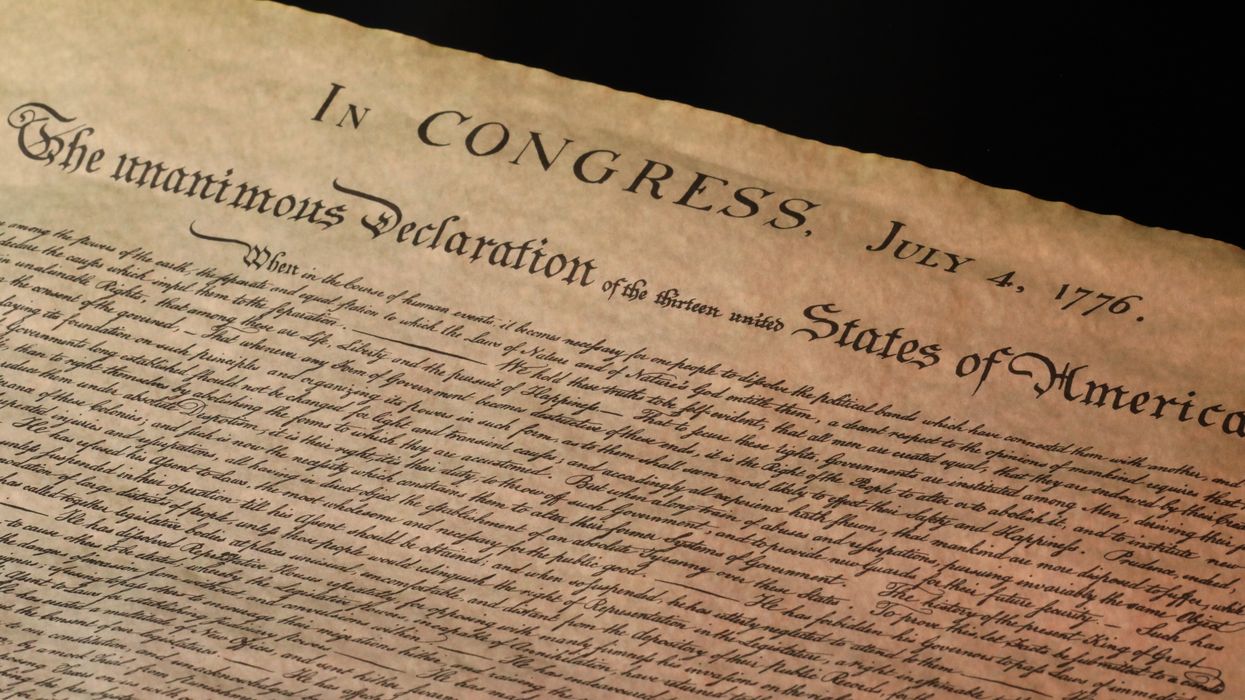I used to think the answer was obvious; it was self-evident. But it's not, at least not in today's political context. MAGA Republicans and Democrats have a very different take on the meaning of this phrase in the Declaration.
I said in my book, We Still Hold These Truths: An America Manifesto, that it is in the interpretation of our founding documents that both the liberal and conservative ideologies that have run throughout our history can be found. This is a perfect example.
Have you ever wondered how a simple phrase like "all men are created equal" can be interpreted so differently? What it frequently comes down to is the political perspective a person has, which in turn influences what they bring to the interpretation.
Interpretation often involves going outside the documents themselves. Conservatives look at the fact that equality certainly wasn't present when the country was founded; the Founders even incorporated slavery into the Constitution with the "3/5 compromise." They thus take the meaning of "all men are equal" to be transactional, to be that the colonists were equal with the British and with King George III, and therefore deserved to be treated in a certain way. When they weren't, it was grounds for revolt and declaring independence. That was the essence after all of the document.
Liberals, on the other hand, look first to the unmitigated words of the Declaration, "that all men are created equal"—"all" means all, there is no equivocation—and second to the fact that Adams, Jefferson, and the other men we think of as the Founders were all men of the Enlightenment. Meaning that the words were to be taken literally, even if as an aspiration rather than pragmatically.
But the search for the correct interpretation does not stop there. Things get more complicated when you go to another source favored by the Heritage Foundation. In a now-famous letter from John Adams to his son Charles, Adams discusses the issue of equality and rights at some length. He begins by saying that,
"As the genuine Equality of human Nature is the true Principle of all our Rights and Duties to one another, it is of great Importance to ascertain what it does mean, and what it does not mean." He goes on to say, "It really means little more than that We are all of the same Species: made by the same God: possessed of Minds and Bodies alike in Essence: having all the same Reason, Passions, Affections and Appetites."
So far, that sounds supportive of the Democrats' position that "all" means all. But then Adams goes on to say that the equality of nature is only a moral equality—"an equality of rights and obligations." By contrast, he notes that physical inequalities in nature are infinite, giving rise to inequalities of wealth and power, and that government has "neither the power nor the right to change them." Inequality is inescapable. What sense are we to make of this language? It sounds like he just gutted the meaning of "all are equal;" one up for the MAGA Republicans.
The context of the letter, however, makes it clear that this was not Adams' intent. He says one has a right to be deaf, to be weak or sickly, which means that government cannot attack you for that; likewise, whether you are poor or rich, government cannot attack you for that. You have that right. The government cannot force you to be other than who you are. The government must respect the infinite physical inequalities of nature.
We usually do not talk about such "rights." To make sense of this, one has to remember that in those days, there were status crimes: to be poor or a debtor was a crime. For revolutionaries, to be rich was a crime.
But while physical inequalities—to be who you are—are a right the government cannot tamper with, Adams makes clear that all people have the moral right to life, liberty, and the pursuit of happiness, which means that people have the right to make the most of themselves that they can. Government has the role of assisting in that endeavor, to "secure" that right. He says that society may establish inequalities in many things, "except of Rights."
Conservatives have used Adam's statements not just to indicate the innate physical [material] inequality of man, but claim that government has no power or right to change that aspect of nature. Yes and no. While Adams clearly stated, as noted above, that the government has no power or right to alter people's unequal status, individuals have the moral right to change themselves. That government is there, as stated in the Declaration, to help them secure that right. This is a distinction with a very real difference.
The answer to the question raised by the title of this article is therefore that "all men are created equal" and "they are endowed with inalienable rights" such as the right to life, liberty, and the pursuit of happiness means indeed that all mankind—meaning all men and women—have these rights. This statement may be aspirational, but that does not lessen its power, and, indeed, it has been the light that has guided the development of America for the last 250 years.
If MAGA adherents want to say that the phrase "all men are created equal" in the Declaration is just transactional, they can point to language that seems to support their view. But when you look at the entire letter, at Adams's insistence on everyone's moral right to equality, that interpretation fails. It is deceitful.
Ronald L. Hirsch is a teacher, legal aid lawyer, survey researcher, nonprofit executive, consultant, composer, author, and volunteer. He is a graduate of Brown University and the University of Chicago Law School and the author of We Still Hold These Truths. Read more of his writing at www.PreservingAmericanValues.com





















